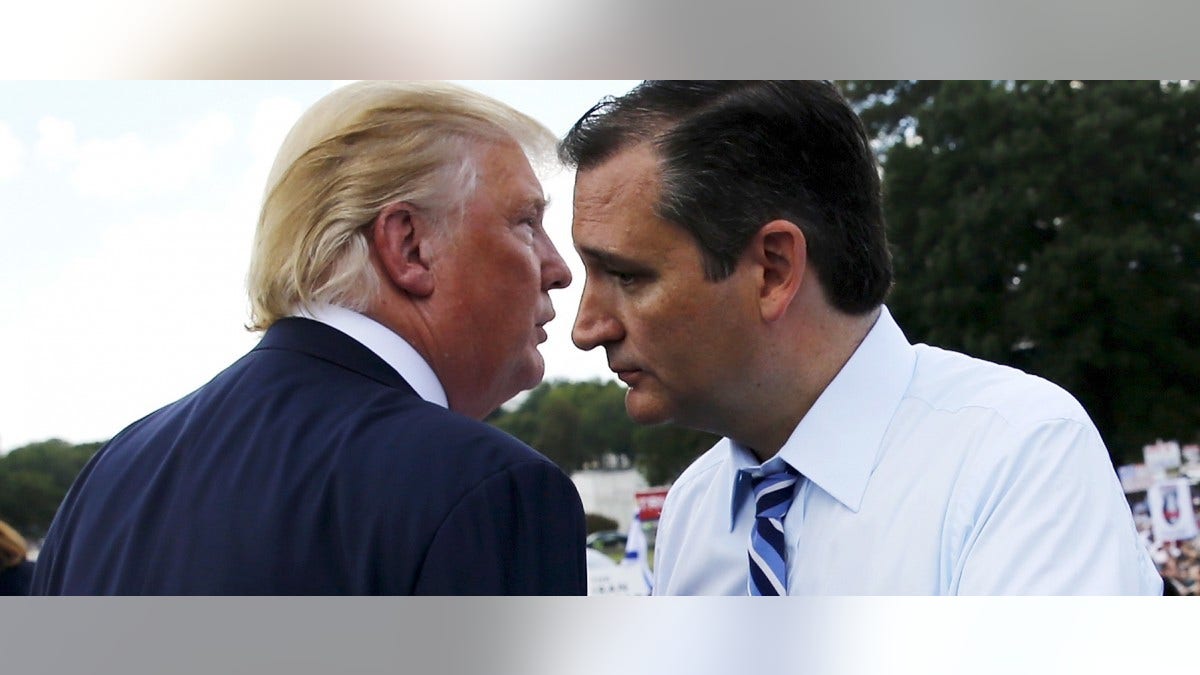
Sept. 9, 2015- Republican presidential candidates Sen. Ted Cruz and Donald Trump at a rally in Washington D.C. (REUTERS)
Like the Titanic’s architects realizing their fatal design flaw right around the first strains of “Nearer My God To Thee,” Republicans are waking up to the realization that their presidential primary scheme is more Frankenstein than Frank Gehry.
To protect an establishment frontrunner against an insurgent, the party frontloaded this year’s primaries and caucuses. Going into March, only 133 delegates had been allocated. Super Tuesday added another 595 delegates. By month’s end, 1,537 of 2,472 delegates will be gone.
The problem: no one figured that, for the first time in modern GOP history, the insurgent would wind up as the frontrunner.
Which leads to the second problem: Republicans looking to stop Donald Trump are running out of opportunities to derail him.
So far, 15 states have allocated delegates. By March 22, another 15 will have gone to the polls, leaving but 20 states between then and the first Tuesday in June (just 11 weeks) to change the GOP narrative.
Returning to the Titanic, let’s presume the Republican ship hasn’t taken on too much water and it’s still a viable contest.
How then to stop Trump?
My suggestion:
1. Keep The Field Populated. To the proposition that the only way to beat Trump is via a head-to-head contest: don’t buy the spin.
The latest NBC News/SurveyMonkey Weekly Election Poll played out such scenarios involving Trump versus Texas Sen. Ted Cruz and Florida Sen. Marco Rubio. The results? Rubio lost by six points; Cruz, by 13.
Assuming Rubio soldiers on past the March 15 vote in Florida, he and Cruz need to strike an accord: they don’t attack each other; their super PACs stick it to Trump. And they draw straws to decide who has to call Jeb Bush to ask for his super PAC join in the Trump-bashing.
Syndicated columnist and Fox News contributor Jonah Goldberg takes this unholy alliance a step further, suggesting a Rubio-Cruz ticket ala Reagan-Bush in 1980. I’m not sure it’s in Cruz’s DNA to be so magnanimous, since he leads Rubio in states won and delegates earned.
Trump may keep winning states moving forward, but from here on it’s a quantity-not-quality argument, with the goal being . . .
2. Keep Trump Under 50 percent. The number that matters most? It’s not states won, but the 1,237 delegates needed to win the GOP nomination.
Of the 1,744 Republican delegates left on the board after Super Tuesday, 391 are in winner-take-all states. The two most important: Florida and Ohio, on March 15. Trump has to be stopped in one, if not both, to slow down the express (at present, he leads in both).
That leaves 1,353 delegates to be allocated either proportionally or by some hybrid scheme. Most crucial of all: states where a 50% majority winner earns all the delegates (Texas has such a system).
Before Super Tuesday, not counting South Carolina where Trump won all 50 delegates, he and Cruz-Rubio split almost equally divided 65 delegates (31 for Trump, 32 for the senators). If something similar occurs in the remaining proportional states, with Trump staying near his mid-30’s ceiling, there’s still a shot at wheeling and dealing in Cleveland.
But before we get there, we’ll have a few…
3. Showdown States. I mentioned Ohio and Florida as must-have’s for the anti-Trump forces. Here are three others to add to the list.
First up: Wisconsin’s April 5 primary, which comes after a two-week break in the action and where last week’s Marquette Law Poll has Trump up by 10.
As the state with the nation’s tenth largest Catholic population, it may be an opportune moment to revisit Trump’s rope-a-Pope. And don’t forget: Wisconsin Gov. Scott Walker had some unkind words about The Donald as he ended his presidential bid.
After that: Indiana’s May 3 primary. The Hoosier State is home to America’s most prophetic county seat. By the first Tuesday in May, it’s an indication of which way the political class leans: Indiana Sen. Dan Coats is no fan; Gov. Mike Pence, who’s up for reelection this fall, hasn’t endorsed.
Finally: if there’s still a race, California and New Jersey on June 7 – again, after a two-week intermission. Establishment Republicans would love nothing more than embarrassing New Jersey Gov. Christie on his home turf. But it’s a winner-take-all state in Trump’s backyard (51 delegates). A more pragmatic strategy would be to go to California and take advantage of a system that awards delegates three apiece for each of the state’s 53 congressional districts.
And from there . . .
4. Outmaneuver Trump Now, Outwit Him Later In Cleveland. Let’s suppose Trump goes to Cleveland close to but shy of a guaranteed first-ballot victory (the GOP’s last multi-ballot convention: 1948).
If no one is elected on the first ballot, all 2,472 delegates can vote for whomever’s name had been placed in nomination. Which means: to outwit Trump in Cleveland, stack the deck with delegates willing to bail on Trump once their commitment is over.
The GOP’s 437 “pledged” delegates (269 Republican officeholders past and present, plus 168 members of the Republican National Committee) would be lowest hanging of anti-Trump fruit. From there, Cruz and Rubio delegates will have to unite.
If the GOP is serious about stopping the insurrection, it intervenes at the grassroots level and shops for voters not only willing to become delegates, but open to the idea of switching candidates at the convention, the political equivalent of changing horses midstream.
Can Trump still be stopped? Yes. But it requires a lot of odd-shaped pieces to fall in place.
Now, if you’ll excuse me, I’m off to sink into a leather chair and enjoy a cigar and brandy – while the violins play and the lifeboats are lowered.
Just in case the unsinkable doesn’t happen.








































